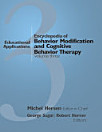Issues in Diagnostic Research
Michel Hersen · Cynthia G. Last
dec. 2012 · Springer Science & Business Media
E-bog
360
Sider
reportBedømmelser og anmeldelser verificeres ikke Få flere oplysninger
Om denne e-bog
Prior and subsequentto the publication of the third edition of the Diagnos tic and Statistical Manual of Mental Disorders (DSM-III), we have witnessed a considerable upsurge in the quantity and quality of research concerned with the psychiatric diagnostic process. There are several factors that have contributed to this empirical influx, including improved diagnostic cri teria for many psychiatric disorders, increased nosological attention to childhood psychopathology, and development and standardization of several structured diagnostic interview schedules for both adult and child populations. With the advent of DSM-III-R, and in anticipation of DSM-IV, diagnostic labels and their definitions have been in a state of change, as evinced by the many refinements and modifications currently taking place. However, the basic purpose or raison d'etre of the nosological scheme has not been altered. Psychiatric diagnosis is the means by which we classify or categorize human psychopathology. And, as is the case in the medical arena, psychiatric diagnosis serves three central functions: classification. communication. and prediction. As research accumulates, our understanding of psychiatric disorders increases, and we are in a much better position to classify reliably and with validity, as well as to com municate and predict Despite periodic changes in the diagnostic system, the basic strategies for conducting diagnostic research (e. g. , genetic-family studies, biological markers, follow-up studies, etc. ) do not vary appreciably over time. But in over one decade no scholarly book has appeared that tackles the essential research issues involved in upgrading the diagnostic endeavor.
Bedøm denne e-bog
Fortæl os, hvad du mener.
Oplysninger om læsning
Smartphones og tablets
Installer appen Google Play Bøger til Android og iPad/iPhone. Den synkroniserer automatisk med din konto og giver dig mulighed for at læse online eller offline, uanset hvor du er.
Bærbare og stationære computere
Du kan høre lydbøger, du har købt i Google Play via browseren på din computer.
e-læsere og andre enheder
Hvis du vil læse på e-ink-enheder som f.eks. Kobo-e-læsere, skal du downloade en fil og overføre den til din enhed. Følg den detaljerede vejledning i Hjælp for at overføre filerne til understøttede e-læsere.





